

How relevant is social interaction in second language learning? Free resources for teens to help improve your English. Giving praise to learners. A common belief about praising learners is that praise should be given privately, based on the idea that learners may feel embarrassed about being praised publicly, but there is no research evidence to suggest that this is true. A recent study has made comparisons between 'loud' or public praise and 'quiet' or private praise in secondary schools and has revealed some interesting findings. John Blaze, a psychologist at The University of Southern Mississippi, compared the effect of both types of praise on behaviour in state school classes in the United States in maths and English classes. The teachers were trained in how to give praise. For example, praise needed to depend on good behavior, be specific as to why the student was praised and given immediately.
The main conclusion from the study was that praise had a dramatic positive effect on learners' behaviour and it didn't matter whether the praise was private or public. Click here to read more about the study. Danilova.ru - Егоркины песенки. Free Online Books for Kids in English and Multi Language. There are numerous benefits of reading, and every child deserves the gift of a good book.
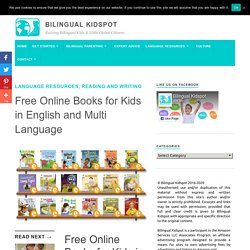
With this list of free online books for kids in English and various other languages, children can read books online free anytime they like. Whether you are lacking books at home for your child’s age group, or you have a home library full of books but your child is bored with those they have, free online books for kids are always accessible if you know where to find them. There is a huge range of books on line for free that you can utilise. Here are a few sites where you can find them. Read Books Online Free. Patricia Kuhl: The linguistic genius of babies. Does being bilingual make you smarter? Language teacher and researcher Miguel Angel Muñoz explains the latest research on how being bilingual affects your brain, ahead of a British Council seminar in Cardiff on whether learning a foreign language makes you smarter. You can watch the live-streamed seminar on Tuesday, 3 June.
More than half the world's population uses two or more languages every day It is hard to estimate the exact number of bilingual people in the world, as there is a lack of reliable statistics . A few more myths about speakers of multiple languages. Does multilingualism cause language delays and identity problems? The British Council's Nayr Ibrahim busts a few more myths about speakers of multiple languages. Myth: Multilingualism causes language delay Raising children bilingually is sometimes believed to cause language delay. This misconception is based on a separate underlying proficiency (SUP) hypothesis. This theory, now discredited, suggests that languages are stored in separate compartments or containers, which represent half the capacity of the monolingual brain. Read Early and Often. Why Read to Babies?
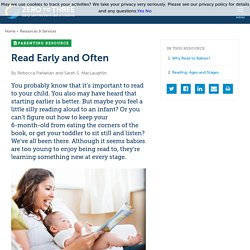
Reading together when babies are as young as 4 months old increases the chances that parents continue reading to babies as they get older. Beginning early is important because the roots of language are developing in a baby’s brain even before he can talk! The more words your baby hears over time, the more words he learns. Tips on Learning to Talk. Learning to talk is a process that starts at birth, when your baby experiences how voices can sound.
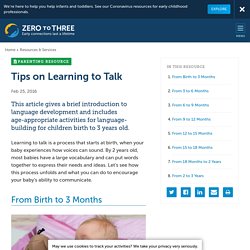
By 2 years old, most babies have a large vocabulary and can put words together to express their needs and ideas. Let’s see how this process unfolds and what you can do to encourage your baby’s ability to communicate. From Birth to 3 Months. TeachingEnglish. English tongue twisters for kids. Building on what children know (free article) - Early Childhood Australia. ‘Take the child on from where they are now’ has long been a slogan in early childhood, but I wonder, as educators, if we always do it? My four-year-old granddaughter, Mia, is extremely capable with modern technologies; she can use a mobile phone and digital camera and browse a DVD to select particular scenes in a movie. She is not ‘print literate’, but she is ‘techno-literate’. I’m not advocating techno-skills for babies, but I am conscious that this competence may not be valued as she goes into preschool. She may well be told ‘that’s ok at home, but we do things differently here’.
My second granddaughter, Maddie, when aged five, entered Prep and, when I asked what she was learning ‘at big school’, she said: ‘We do an awful lot of counting’. Useful comments and conversations October November 2019. Continuum. Information sheet Guidelines for documenting children s learning. Pre-birth to Three: Observation, Assessment and Planning. Observation, Assessment and Planning - Early Years Matters. The EYFS Profile summarises and describes children’s attainment at the end of the EYFS. It is based on on-going observation and assessment in the three prime and four specific areas of learning, and the three learning characteristics, set out below: The prime areas of learning: • communication and language • physical development • personal, social and emotional development.
The Key to Effective Classroom Management. It’s a daunting but all-too-common sight for many teachers: A classroom full of rowdy students who are unable to focus on the lesson. Classroom management techniques may get things back on track, but valuable time has already been lost. Many experienced teachers know that making meaningful connections with students is one of the most effective ways to prevent disruptions in the first place, and a new study set out to assess this approach. In classrooms where teachers used a series of techniques centered around establishing, maintaining, and restoring relationships, academic engagement increased by 33 percent and disruptive behavior decreased by 75 percent—making the time students spent in the classroom more worthwhile and productive.
“Strong teacher-student relationships have long been considered a foundational aspect of a positive school experience,” explains Clayton Cook, the lead author of the study and a professor at the University of Minnesota. Relationship reflection form. A 19-Year Study Reveals Kindergarten Students With These 2 Skills Are Twice as Likely to Obtain a College Degree (and They Have Nothing to Do With Reading) Don't Expect Toddlers To Behave Consistently — They Literally Can't. One day, when my oldest daughter was not quite 2, she wouldn’t sit still to let me change her diaper. Squirrelly and writhing, she made a game out of staying half naked. She wasn’t fussing about it or anything — in fact, she was giggling maniacally.
The problem was that we were running late. Nothing I did seemed to faze her. Can Free Play Prevent Depression and Anxiety In Kids? Public Media for Northern CA. This ‘Kindness Curriculum’ Is Free And Should Be Used In Every Classroom. Imagine living in a world that valued kindness enough to teach it along with academics. Educators would teach kids to manage their emotions in addition to standard curriculum such as math and science. Sounds pretty amazing, doesn’t it? Well, the Center for Healthy Minds at the University of Wisconsin-Madison has created a free “kindness curriculum” for kids, designed to do just that. It’s a mindfulness-based curriculum for preschoolers that will bring kindness into the classroom. “Faced with mental and physical health challenges at a global scale, we conduct rigorous scientific research to bring new insights and tools aimed at improving the wellbeing of people of all backgrounds and ages,” states the Center’s mission statement.
So how exactly does that work? Using “Peace Wands” The children in this program use peace wands to help with conflict resolution. The child with the heart wand describes what they’re feeling “in their heart.” Creating ‘Kindness Gardens’ Background to the Concept of Schema. EducatorsEn. NQS PLP E Newsletter No36. Environment 3 5 yr olds. Surprisingly Simple Techniques for Challenging Behaviour - Kathy Brodie Early Years Training. I often get asked about children’s behaviour. It is a massive topic, with many facets. However, I would always start from the perspective that all behaviour, good or unacceptable, is a form of communication. It is how we, as practitioners and adults, respond to that communication that makes all the difference. The Webster Stratton method is a well known and widely used behaviour management strategy.
It is based on a hierarchy pyramid, with Play at the foundation, moving up through Praise, Limit setting, Ignoring and using Time out as a final resort. When working with parents, there is a focus each week on one element, and the strategies are then constructed from this information. Learning Time with Timmy (2-6 years) Whole Child Development Is Undervalued. The question is how to make such an approach both systemic and sustainable. Whole Person Socio-emotional, physical, creative, and cognitive capacities are deeply intertwined and equally important in ensuring a child's wellbeing, learning, and growth.
(That shouldn't be a surprise to anyone studying or supporting children's learning.) Nobel laureate James Heckman, a professor of economics at the University of Chicago, has shown that the non-cognitive skills emerging in early childhood are among the strongest predictors of adult outcomes. And Paul Tough, author of How Children Succeed, has continued to emphasize the crucial role that soft skills play in character formation and building on persistence, curiosity, and even grit -- the "passion and perseverance for very long-term goals," according to psychologist Angela Lee Duckworth. School Radio - Nursery songs and rhymes.
Ey making mark matters76708 1. How teachers can help children enjoy singing. Music is one of life's greatest pleasures.
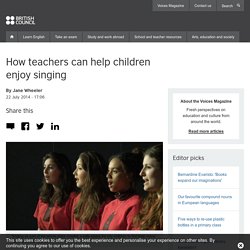
So how can teachers encourage shy children to sing? Jane Wheeler is a singing leader on the British Council's World Voice programme teaching children around the world to sing in each other's languages. She shares her tips here. How to teach children English using illustrated storybooks. What makes illustrated storybooks such a good resource for teaching young learners of English? The British Council’s Gail Ellis, co-author of a storytelling handbook for primary English language teachers, explains. Listen to an interview with Gail in our podcast and register for her webinar taking place on Thursday, 2 October. Illustrated storybooks provide an ideal resource for helping children learn English. This is because children love listening to stories. Sound Words: Examples of Onomatopoeia. Onomatopoeia is a fun, linguistic tool used in literature, songs and advertisements.
Now that you've seen examples of the individual words, consider the following examples of onomatopoeia words in use. The power of positive relationships. Talking with Babies and Toddlers June05. PowerfulInteractions. Schema and Fairies - Kathy Brodie Early Years Training. Schemas are one of those things that divide practitioners, like fairies at the bottom of the garden. Schemas in Children’s Play - N a t u r e P l a y. Written by Clare CaroSchemas in Children’s Play are such an important concept when it comes to the development of our children that it’s worth taking the time to understand them so you can facilitate them when you see them.What are these schemas?
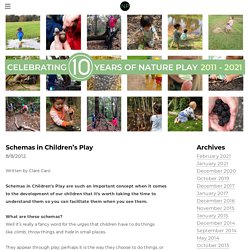
Early Literacy. 2Bbellybreathhome. Does my toddler have a short attention span because she won’t sit still for a story? A: It is perfectly normal for toddlers to not sit still very long—period.
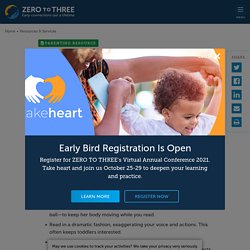
Most don’t like to stay in one place for long now that they can explore in so many new ways—by running, jumping, and climbing. So, an adult’s idea of snuggling on the couch to hear a story may not be the same idea a toddler has for story-time. NO MORE CHALLENGING BEHAVIOR CHEAT SHEET. You speak with an accent. I don’t. Accents are things that only other people have. They are, by extension, things that you don’t want to have. Accents are, in short, shortcomings. The Power (and Peril) of Praising Your Kids. The cognitive benefits of play: Effects on the learning brain. © 2008 - 2014, Gwen Dewar, Ph.D., all rights reserved Science supports many of our intuitions about the benefits of play. Primary school shake-up to focus on ‘play-led’ learning. Children at primary schools would not study traditional subjects until as late as 10 years of age, under proposals being considered by policymakers.
Importance of play for babies & children. Driven to Discover: How Thinking Skills Develop Through Everyday Play and Exploration. Getting the right balance between adult-led and child-initiated learning. As an early years practitioner you will know the importance of creating the right balance between adult-led and child-initiated learning. Tips on Learning to Talk. A few more myths about speakers of multiple languages. Does being bilingual make you smarter? Patricia Kuhl: The linguistic genius of babies. Alison Gopnik: What do babies think? How young children learn English as another language. Ten ways to support your child’s English-learning at home. How can young children best learn languages? TeachingEnglish. How to start teaching kids English at home. Paddington. Peter RabbitPeter Rabbit. About The Snowman - The Snowman. TeachingEnglish.
How teachers can help children enjoy singing. Songs for kids. GUEST POST: To Test or Not To Test? That Is Not The Question — The Learning Scientists. Grammar auction. THE Number 1 Bit of Classroom Kit: Mini-whiteboards. Edu practices 21 eng. Cognitive load theory VR AA3. DIY Resources. Poems for kids. Songs for kids. Music and Movement Activities for Toddlers and Preschoolers. School Radio - Nursery songs and rhymes. 50+ Quick & Easy Kids Crafts that ANYONE Can Make! Short stories for kids. How to teach children English using illustrated storybooks. Children under 5 years. Children under 5 walking.
The Art of Control. Children under 5 years. How to help your child learn English with YouTube videos. Practical tips. Sound Words: Examples of Onomatopoeia. Serve and Return. The Brain-Changing Power of Conversation. MIT Brain Study: Back-And-Forth Talk Key To Developing Kids' Verbal Skills. How you talk to your child changes their brain. NQS PLP E Newsletter No43. Carol Dweck: The power of believing that you can improve. How can parents and teachers best educate young children? A longitudinal investigation of the role of quantity and quality of child-directed speech in vocabulary development. Listening Skills for Staff. What to consider when teaching English in large classes. Teaching large classes. Surprisingly Simple Techniques for Challenging Behaviour - Kathy Brodie Early Years Training.